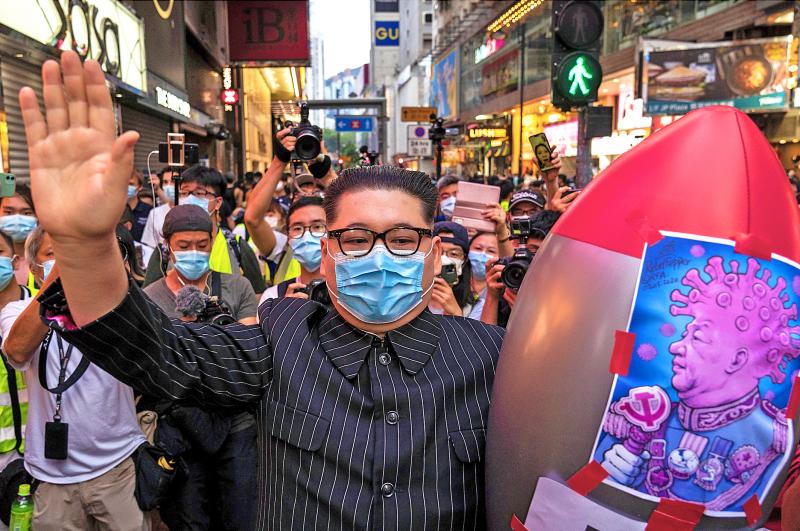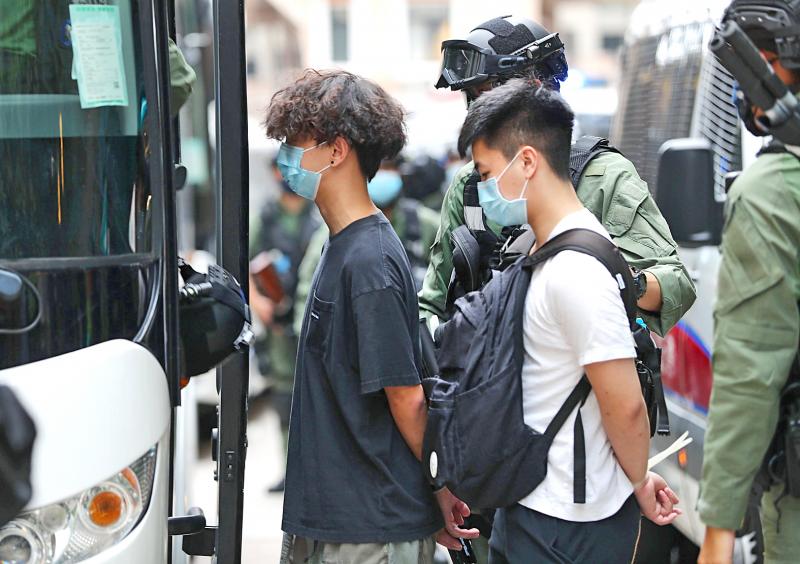Dozens of democracy supporters were arrested in Hong Kong yesterday after defying a protest ban as the territory marked China’s National Day and its leader hailed Beijing’s new National Security Law for restoring stability.
The People’s Republic of China celebrates its founding on Oct. 1, but in Hong Kong it has become a day of grievance for those worried about authoritarian Beijing’s intensifying crackdown against its opponents.
Protest has been effectively outlawed for most of this year due to COVID-19 restrictions on gatherings and Beijing also imposed national security legislation on the territory in June.

Photo: Bloomberg
Helicopters flying Chinese and Hong Kong flags buzzed over the harbor yesterday morning as Hong Kong Chief Executive Carrie Lam (林鄭月娥) and senior mainland officials attended a ceremony ringed by police and security barriers.
“Over the past few months, an indisputable fact in front of everyone is that our society has returned to peace,” Lam said.
“Our country’s national security has been protected in Hong Kong, and our citizens can again exercise their rights and liberties in accordance with laws,” she said.

Photo: AFP
Hours later riot police swooped on people chanting slogans in Causeway Bay.
Police said that at least 60 were detained, mostly for “unlawful assembly.”
Officers raised banners warning people that they were breaching the national security legislation with their protest chants.
Last year’s National Day, China’s 70th anniversary, brought fierce clashes between protesters and police amid seven months of democracy demonstrations that upended Hong Kong.
Authorities denied permission for a protest march this year, citing security concerns and a ban on more than four people gathering in public amid the pandemic.
A police source told reporters that 6,000 police officers had been drafted to stop any protests — double the contingency usually placed on reserve.
Throughout the morning, groups of prominent democracy advocates held small protests — deliberately keeping to no more than four people.
“In today’s China, those who pursue freedom are suppressed, while those doing the suppressing are in power,” activist Lee Cheuk-yan (李卓人) told reporters.
One group, surrounded by about 40 police officers, chanted: “End one-party rule” and burned a protest petition.
Others gathered outside the heavily guarded Hong Kong Liaison Office, which represents Beijing’s government in the territory.
A day earlier, office director Luo Huining (駱惠寧) gave a speech calling for more patriotism to be instilled in Hong Kong, saying pride in the motherland was a duty, not a choice.
In Causeway Bay — which saw many clashes last year — riot police vastly outnumbered residents, shoppers and those chanting slogans.
Officers quickly stopped and searched, or warned to leave, people deemed suspicious — one man playing a protest song on a whistle, another waving a yellow balloon, the color associated with the democracy movement.
One protester, who gave only his first name Ricky, said he had chosen to read Hong Kong’s Apple Daily newspaper — a pro-democracy publication — in public.
“Everyone knows that under the national security law you can no longer say many things, but I still want to come out, even if it’s only a tiny effort I can make,” he told reporters.

Authorities have detained three former Taiwan Semiconductor Manufacturing Co (TMSC, 台積電) employees on suspicion of compromising classified technology used in making 2-nanometer chips, the Taiwan High Prosecutors’ Office said yesterday. Prosecutors are holding a former TSMC engineer surnamed Chen (陳) and two recently sacked TSMC engineers, including one person surnamed Wu (吳) in detention with restricted communication, following an investigation launched on July 25, a statement said. The announcement came a day after Nikkei Asia reported on the technology theft in an exclusive story, saying TSMC had fired two workers for contravening data rules on advanced chipmaking technology. Two-nanometer wafers are the most

NEW GEAR: On top of the new Tien Kung IV air defense missiles, the military is expected to place orders for a new combat vehicle next year for delivery in 2028 Mass production of Tien Kung IV (Sky Bow IV) missiles is expected to start next year, with plans to order 122 pods, the Ministry of National Defense’s (MND) latest list of regulated military material showed. The document said that the armed forces would obtain 46 pods of the air defense missiles next year and 76 pods the year after that. The Tien Kung IV is designed to intercept cruise missiles and ballistic missiles to an altitude of 70km, compared with the 60km maximum altitude achieved by the Missile Segment Enhancement variant of PAC-3 systems. A defense source said yesterday that the number of

A bipartisan group of US representatives have introduced a draft US-Taiwan Defense Innovation Partnership bill, aimed at accelerating defense technology collaboration between Taiwan and the US in response to ongoing aggression by the Chinese Communist Party (CCP). The bill was introduced by US representatives Zach Nunn and Jill Tokuda, with US House Select Committee on the Chinese Communist Party Chairman John Moolenaar and US Representative Ashley Hinson joining as original cosponsors, a news release issued by Tokuda’s office on Thursday said. The draft bill “directs the US Department of Defense to work directly with Taiwan’s Ministry of National Defense through their respective

Tsunami waves were possible in three areas of Kamchatka in Russia’s Far East, the Russian Ministry for Emergency Services said yesterday after a magnitude 7.0 earthquake hit the nearby Kuril Islands. “The expected wave heights are low, but you must still move away from the shore,” the ministry said on the Telegram messaging app, after the latest seismic activity in the area. However, the Pacific Tsunami Warning System in Hawaii said there was no tsunami warning after the quake. The Russian tsunami alert was later canceled. Overnight, the Krasheninnikov volcano in Kamchatka erupted for the first time in 600 years, Russia’s RIA